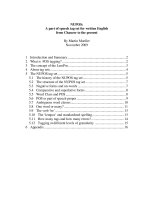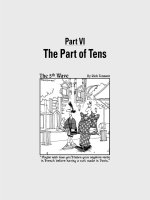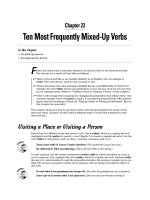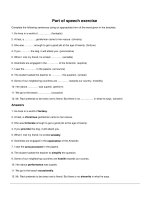part of my argument
Bạn đang xem bản rút gọn của tài liệu. Xem và tải ngay bản đầy đủ của tài liệu tại đây (108.46 KB, 3 trang )
Another important aspect of this period is the large-scale expansion of British imperial power.
By 1830,the British empire had, of course, existed for centuries, and had already experienced
many boons and setbacks. Perhaps the most significant blow to its power occurred in the late
18th century with thesuccessful revolt of its 13 American colonies, an event which would
eventually result in the formation of theUnited States as we now know it. During the 19th
century, the British empire extensively expanded its colonial presence in many parts of Africa, in
India, in the middle-east and in other parts of Asia. This process has had many long-term
effects, including the increased use of the English language outside of Europe and increased
trade between Europe and distant regions. It also, of course, produced some long-standing
animosity in colonized regions.
. Prostitution
Moral uproar concerning prostitution was at its peak in the 1850s1860s, mainly because it highlighted a sort of female sexual
freedom. These women, though still indirectly controlled by men,
had economic autonomy. In cases such as Long Susan’s brothel in
‘Ripper Street,’ they also had more protection than the average
non-married female in Victorian society.
Prostitution was, however, legal, at this time in Europe, making it
an honest profession for a woman who had no other means of
supporting herself, not to mention a roof over her head.
/> />
•
Providers
During Victorian times men across socio-economic lines were
strongly expected to provide for their families. Conversely, married
women were expected not to work outside the home. The gender lines, as
they regarded work, were strongly drawn. Men's work was meant to
provide monetarily for the family while a woman's work, if she worked at
all, was at home keeping the home.
•
•
•
Protectors
In many ways Victorian gender roles were a matter of give and take.
A good example is the Victorian attitude that women were the angels of
their home, with a high value placed on delicacy and even illness. This
placed Victorian men in the position of protector. The Victorian era was a
chivalrous time, when men took their role as family protector very
seriously.
Superior
Victorian men had far more rights than their female counterparts.
Many of the rights denied women, such as voting and property ownership,
were denied because of the Victorian attitude that men were superior
in mind and body. Victorian men were believed to be better able to make
rational decisions than women of the same time. They were better
educated, as a rule, and were strongly considered the heads of their
families.
Fallen
Converse to the idea that Victorian men were superior to women,
they also were considered fallen. Victorian men considered themselves
sinners who could be saved by a virtuous woman. Because of this they
held virginal women, who seemed to have no appetite for anything carnal,
in high esteem. This attitude forgave men for behavior that would have
been unacceptable in a woman.
Read more: />
The etiquette expected for a woman during the Victorian era depended largely on
which social class they belonged to. Those who lived as members of the upper
classes received knowledge--since birth--on how to behave like a lady. Lower class
women held more leeway in regard to behavioral standards for that time
period. Middle class females had a bit more freedom. However, mothers and
guardians generally encouraged them to learn proper etiquette.
•
Significance
Certain female social behaviors came down to black or white on certain etiquette rules
with no gray area in between. Women had to welcome a man's offer of assistance if that man
was considered a gentlemen. Victorian females appropriate mannerisms forbade them to say
an adult's first name while out in public. The acceptability of a woman's skirt to raise in
public--with the exception of crossing deep mud--held implicate restrictions--because their
ankles couldn't show. Women could not speak above a natural and desirable vocal pitch.
Proper behavior forbade the use of obnoxious speech.
•
•
Dressing Rooms
The male dominated world during Victorian times granted women haven only while
they got ready in their dressing rooms--a place men never entered into. Once inside;
however, ladies still created, practiced and put together their appearances before stepping out
to greet the world. In the dressing rooms, women made sure that they put their hair up
because it wasn't acceptable for them to leave it down. Married women had to maintain a
good appearance for their husbands. Most of the work entailed involved making themselves
appear desirable got done in their dressing room.
Considerations
Society saw sweeping changes during the Victorian era. Large industries began
cropping up everywhere. Those who once had no money rose up to form a wider middle
class. As this happened, they started to demand acceptance as ladies and gentlemen. Women
who never learned proper etiquette studied everything they could find. The 1850s saw a
major rise in the production of etiquette books. More women than ever learned what being a
lady entailed.
Read more: />









